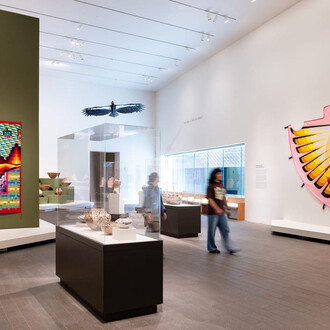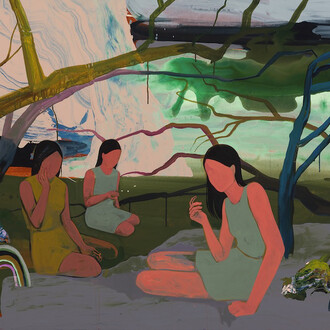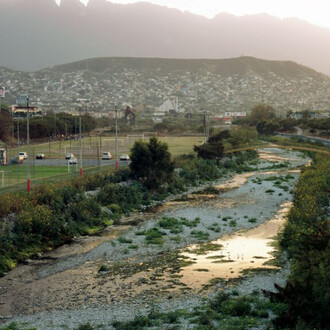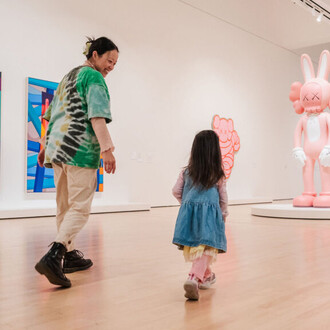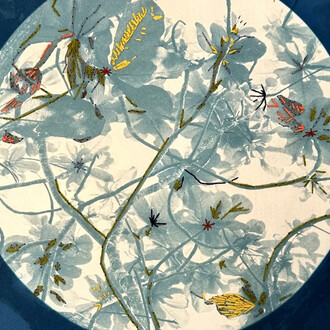We have a history— artist Leilah Babirye’s (Ugandan, b. 1985) first solo museum exhibition in the US—speaks to the power of reclaiming identity and creating community through artistic practices. Through 12 sculptures exhibited alongside works from the historical African Art collection of the Fine Arts Museums of San Francisco (the “Fine Arts Museums”), Babirye illuminates the connections between past and present and the evolving nature of African arts that is at the heart of the Fine Arts Museums’ African Art program. Inspired by the gender fluidity of a Dogon ancestral figure in the Fine Arts Museums’ African art collection and working with natural clay, wood and found materials Babirye has created three new sculptures for the exhibition.
We have a history introduces the powerful and urgent work of Leilah Babirye, a leading voice in contemporary sculpture and queer activism. It is the second in a series of exhibitions in our new African Art program, which explores the legacy of African creative traditions and their profound impact across historical, geographic, and aesthetic lines” stated Thomas P. Campbell, Director and CEO of the Fine Arts Museums of San Francisco.
Born in Kampala, Uganda, and based in New York, Babirye engages in a multidisciplinary practice steeped in activism. She transforms marginalized materials into objects to create queer community and belonging. Through her highly expressive, ambiguously gendered sculptures in ceramic, wood, and discarded objects, the artist reclaims ceramic and wood-carving traditions from West and Central Africa. She hand-builds her ceramics, firing them with expressive glazes, while she whittles, scorches, and burnishes her wood sculptures. As a final touch, she adorns them with wire, bicycle chains, inner tubes, and other found metals and materials collected from the streets of New York. Her choice to use discarded materials in her work is intentional—the pejorative term for the gay community in the Luganda language is abasiyazi, meaning “sugarcane husk”. In other words, Babirye explains, “It’s rubbish—the part of the sugarcane you throw out”. She reclaims this term as a gesture of liberation in her work.
Babirye’s sculptures range in scale from towering totemic forms to busts, talismans, and masks that form portraits of her LGBTQ+ community. She gives each sculpture a name that is rooted in traditions of clanship and the Kingdom of Buganda. One of the largest of the medieval kingdoms in present-day Uganda, Buganda was established in the late 14th century along the shore of Lake Victoria and evolved to become an important and powerful state during the nineteenth century. Babirye invokes the openly bisexual 19th century Bugandan king Mwanga II to support her critique of the homophobic attitudes that took root in Uganda during colonialism. Adorned with metal and nails, her sculptures of queer queens are named after contemporary princes and princesses within Buganda’s royal family.
“Leilah Babirye represents a new generation of sculptors transcending traditional boundaries while maintaining a deep connection to its roots. Her monumental sculptures have become recognized symbols of queer Black love , celebrating the resilience and ingenuity of African people while also preserving their rich cultural heritage. She has pushed sculpture forward by carving a place for queer artists and queer community while creating some of the most interesting, challenging, and ambitious forms—freely transforming the body, prodding social taboos, and redefining beauty“, added Natasha Becker, Curator of African Art, The Fine Arts Museums of San Francisco.
Babirye innovates on historical African sculpture with the contemporary techniques in ceramics, sculpture, and design that she learned at university in Uganda. Through her dynamic artistic practice and heritage rooted in Africa, she reclaims personal and cultural identities to create a sense of belonging for queer Black people in the present. We Have a History creatively reengages objects in the Fine Arts Museums’ African art collection that speak to ideas of community and belonging.







